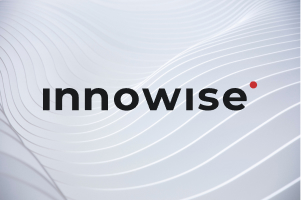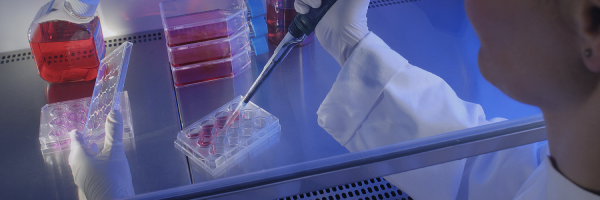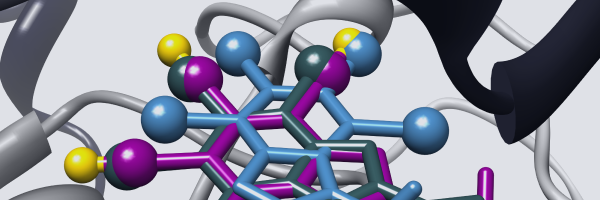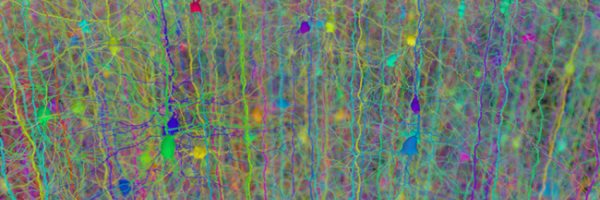Ihre Nachricht wurde gesendet.
Wir werden Ihre Anfrage bearbeiten und uns so schnell wie möglich mit Ihnen in Verbindung setzen.
Das Formular wurde erfolgreich abgeschickt.
Weitere Informationen finden Sie in Ihrem Briefkasten.

Sprache auswählen

KI verändert die Pharmaindustrie, und einer der größten Einflussbereiche liegt im Prozess der Arzneimittelentwicklung. Mithilfe fortschrittlicher Algorithmen für maschinelles Lernen wie Transformatormodellen und grafischen neuronalen Netzen sowie riesigen Datenmengen beschleunigt KI die Entdeckung neuer Behandlungsmethoden und verbessert die Effizienz des gesamten Entwicklungsprozesses.
Bevor wir ein Medikament entwickeln, müssen wir das therapeutische Ziel genau bestimmen – ein bestimmtes Enzym, ein mutiertes Gen oder einen kritischen Signalweg. Durch die Analyse großer biologischer Daten, einschließlich genomischer und transkriptomischer Informationen aus der Sequenzierung der nächsten Generation (NGS), hilft KI dabei, die besten therapeutischen Möglichkeiten zu identifizieren und komplexe Muster und Zusammenhänge aufzudecken, die mit herkömmlichen Methoden möglicherweise nicht erkannt werden. Dies führt zur Entdeckung neuer Ziele und innovativer Behandlungen.

KI optimiert die präklinische Forschung, indem sie Daten aus In-vitro- und In-vivo-Studien auswertet, um die Wirksamkeit und Toxizität von Verbindungen vorherzusagen. Diese Methode hilft Forschern, kluge Entscheidungen darüber zu treffen, welche Verbindungen sie weiterverfolgen und so Zeit und Ressourcen sparen. Darüber hinaus kann KI das experimentelle Design bei der präklinischen Auswahl von Arzneimittelkandidaten für die weitere Entwicklung optimieren.

KI verändert das Arzneimitteldesign durch die Entwicklung neuartiger Molekülstrukturen, die auf Wirksamkeit und Sicherheit optimiert sind. KI-Algorithmen identifizieren vielversprechende Kandidaten und erforschen den chemischen Raum jenseits der Grenzen traditioneller Methoden, indem sie riesige Datensätze bestehender Verbindungen und ihrer Zielinteraktionen analysieren. Dies beschleunigt die Entdeckung innovativer Behandlungen mit dem Potenzial, ungedeckte medizinische Bedürfnisse zu decken.

KI-gestützte prädiktive Modellierung und Simulation verfeinert das Arzneimitteldesign weiter, indem sie das Verhalten komplexer biologischer Systeme nachahmt. Dieser In-silico-Ansatz sagt die Wirksamkeit von Arzneimitteln in verschiedenen Stadien voraus, von der Absorption und Verteilung bis hin zum Stoffwechsel und zur Ausscheidung: Auf diese Weise können die Forscher Arzneimittelkandidaten mit gewünschten Eigenschaften leicht identifizieren, bevor sie kostspielige experimentelle Tests durchführen. Dies verbessert die Chancen auf klinischen Erfolg erheblich.

KI spielt bei klinischen Studien eine immer wichtigere Rolle. Sie wird verwendet, um Daten aus früheren Studien zu analysieren, Muster zu erkennen und potenzielle Probleme vorherzusagen. Dies hilft Forschern, bessere Studien zu entwerfen, die richtigen Patienten zu finden und die Erfolgschancen zu erhöhen, während gleichzeitig Kosten und Zeitaufwand reduziert werden. KI kann ihnen auch dabei helfen, Patienten für klinische Studien leicht zu finden und zu rekrutieren. Sie kann Patienten auf der Grundlage ihrer spezifischen Merkmale und der Studienkriterien Studien zuordnen.

Die Weiterentwicklung der personalisierten Medizin wird durch die Fähigkeit der KI unterstützt, große Mengen genomischer Patientendaten und Krankengeschichten zu analysieren, um individuelle Biomarker zu identifizieren und gezielte Therapien zu entwickeln. Darüber hinaus analysiert die KI reale Beweise und Daten aus der Überwachung nach der Markteinführung, um potenzielle Sicherheitsprobleme zu identifizieren und die Behandlungsergebnisse in realen Umgebungen zu verbessern.

Bevor wir ein Medikament entwickeln, müssen wir das therapeutische Ziel genau bestimmen – ein bestimmtes Enzym, ein mutiertes Gen oder einen kritischen Signalweg. Durch die Analyse großer biologischer Daten, einschließlich genomischer und transkriptomischer Informationen aus der Sequenzierung der nächsten Generation (NGS), hilft KI dabei, die besten therapeutischen Möglichkeiten zu identifizieren und komplexe Muster und Zusammenhänge aufzudecken, die mit herkömmlichen Methoden möglicherweise nicht erkannt werden. Dies führt zur Entdeckung neuer Ziele und innovativer Behandlungen.

KI optimiert die präklinische Forschung, indem sie Daten aus In-vitro- und In-vivo-Studien auswertet, um die Wirksamkeit und Toxizität von Verbindungen vorherzusagen. Diese Methode hilft Forschern, kluge Entscheidungen darüber zu treffen, welche Verbindungen sie weiterverfolgen und so Zeit und Ressourcen sparen. Darüber hinaus kann KI das experimentelle Design bei der präklinischen Auswahl von Arzneimittelkandidaten für die weitere Entwicklung optimieren.

KI verändert das Arzneimitteldesign durch die Entwicklung neuartiger Molekülstrukturen, die auf Wirksamkeit und Sicherheit optimiert sind. KI-Algorithmen identifizieren vielversprechende Kandidaten und erforschen den chemischen Raum jenseits der Grenzen traditioneller Methoden, indem sie riesige Datensätze bestehender Verbindungen und ihrer Zielinteraktionen analysieren. Dies beschleunigt die Entdeckung innovativer Behandlungen mit dem Potenzial, ungedeckte medizinische Bedürfnisse zu decken.

KI-gestützte prädiktive Modellierung und Simulation verfeinert das Arzneimitteldesign weiter, indem sie das Verhalten komplexer biologischer Systeme nachahmt. Dieser In-silico-Ansatz sagt die Wirksamkeit von Arzneimitteln in verschiedenen Stadien voraus, von der Absorption und Verteilung bis hin zum Stoffwechsel und zur Ausscheidung: Auf diese Weise können die Forscher Arzneimittelkandidaten mit gewünschten Eigenschaften leicht identifizieren, bevor sie kostspielige experimentelle Tests durchführen. Dies verbessert die Chancen auf klinischen Erfolg erheblich.

KI spielt bei klinischen Studien eine immer wichtigere Rolle. Sie wird verwendet, um Daten aus früheren Studien zu analysieren, Muster zu erkennen und potenzielle Probleme vorherzusagen. Dies hilft Forschern, bessere Studien zu entwerfen, die richtigen Patienten zu finden und die Erfolgschancen zu erhöhen, während gleichzeitig Kosten und Zeitaufwand reduziert werden. KI kann ihnen auch dabei helfen, Patienten für klinische Studien leicht zu finden und zu rekrutieren. Sie kann Patienten auf der Grundlage ihrer spezifischen Merkmale und der Studienkriterien Studien zuordnen.

Die Weiterentwicklung der personalisierten Medizin wird durch die Fähigkeit der KI unterstützt, große Mengen genomischer Patientendaten und Krankengeschichten zu analysieren, um individuelle Biomarker zu identifizieren und gezielte Therapien zu entwickeln. Darüber hinaus analysiert die KI reale Beweise und Daten aus der Überwachung nach der Markteinführung, um potenzielle Sicherheitsprobleme zu identifizieren und die Behandlungsergebnisse in realen Umgebungen zu verbessern.

Multiomics-Datenanalyse
Klinische Datenanalyse
Wissenschaftliche Forschungsdatenanalyse
De novo Arzneimitteldesign
ML + Molekulardynamik
ML + Molekulares Docking
ML + Pharmakokinetische Modellierung
Trefferidentifizierung
Patientenstratifizierung
Data Mining
Arzneimitteloptimierung

Verbessern Sie Ihre KI-gesteuerte Arzneimittelentdeckung mit Innowise.
KI wird die Pharmaindustrie grundlegend verändern: Sie bietet zahlreiche Vorteile, die den Prozess der Arzneimittelentdeckung und -entwicklung reibungsloser und effizienter gestalten.
Dank der schnellen Analyse riesiger Datensätze beschleunigen ML-Algorithmen jede Phase, von der Zielidentifizierung und Lead-Optimierung bis hin zum Design klinischer Studien und der Neuverwendung von Medikamenten. Im Vergleich zu herkömmlichen Methoden verkürzt dieses beschleunigte Tempo die Entwicklungszeiten erheblich und senkt die Kosten.

Richtig trainierte KI-Modelle können kritische Eigenschaften wie Zielbindungsaffinität, pharmakokinetische/pharmakodynamische Profile und ADMET-Eigenschaften vorhersagen – und Forschern so dabei helfen, Medikamente mit verbesserter Wirksamkeit zu entwickeln. Dieser KI-gesteuerte Ansatz optimiert Medikamentenkandidaten für eine bessere Zielbindung, geringere Toxizität und letztlich bessere Patientenergebnisse.

KI-Modelle helfen auch bei der Optimierung des Designs klinischer Studien, indem sie durch prädiktive Biomarker ideale Patientenkohorten identifizieren und Studienprotokolle hinsichtlich ihrer Effizienz verfeinern. Dieser zielgerichtete Ansatz erhöht die Wahrscheinlichkeit erfolgreicher Studienergebnisse und beschleunigt die Bereitstellung lebensverändernder Medikamente für Patienten.

KI erhöht die Vorhersagekraft bei der Arzneimittelentdeckung erheblich und hilft Forschern, das Verhalten, die Wirksamkeit und die Sicherheitsprofile von Arzneimitteln vorherzusagen. Mithilfe verschiedener Techniken identifiziert KI frühzeitig vielversprechende Kandidaten und potenzielle Risiken und beschleunigt die Entwicklungszeitpläne.

KI-Algorithmen analysieren große Datensätze, um neue therapeutische Anwendungen für bestehende Medikamente zu identifizieren. Diese Strategie der Arzneimittelumwidmung beschleunigt den Entwicklungszeitraum, da diese Medikamente bereits über etablierte Sicherheitsprofile und klinische Daten verfügen, was den Bedarf an umfangreichen und kostspieligen De-novo-Studien verringert.

KI analysiert patientenspezifische Daten, einschließlich genetischer und molekularer Profile, um Behandlungen für optimale Wirksamkeit maßzuschneidern. Beispielsweise kann KI die Reaktion einer Person auf eine bestimmte Chemotherapie auf der Grundlage der genetischen Zusammensetzung ihres Tumors vorhersagen, sodass Onkologen die wirksamste Behandlung auswählen und gleichzeitig Nebenwirkungen minimieren können. Dieser personalisierte Ansatz maximiert den Nutzen für einen einzelnen Patienten.

KI automatisiert das Hochdurchsatz-Screening großer Substanzbibliotheken, um vielversprechende Arzneimittelkandidaten effizienter als mit herkömmlichen Methoden zu identifizieren. Durch die Analyse molekularer Strukturen und die Vorhersage ihrer Wechselwirkungen mit Zielproteinen kann KI Verbindungen mit der höchsten Erfolgswahrscheinlichkeit priorisieren, was den Zeit- und Kostenaufwand in den frühen Phasen der Arzneimittelentdeckung erheblich reduziert.

KI-Algorithmen analysieren das Zusammenspiel von Inhaltsstoffen und ihren Einfluss auf Stabilität, Löslichkeit und Bioverfügbarkeit und sagen optimale Arzneimittelformulierungen voraus. So kann KI beispielsweise modellieren, wie sich verschiedene Hilfsstoffe auf die Auflösungsrate und Absorption eines Arzneimittels im Magen-Darm-Trakt auswirken, was zu einer verbesserten Wirksamkeit des Arzneimittels, einer einfacheren Verabreichung (z. B. oral statt intravenös) und einer besseren Compliance der Patienten führt.

KI-gestützte Analysen identifizieren ideale Kandidaten für klinische Studien auf der Grundlage einer umfassenden Analyse der Patientendaten, einschließlich Krankengeschichte, demografischer und genetischer Informationen. Sie identifizieren Patienten, die am wahrscheinlichsten positiv auf eine Behandlung reagieren. Diese gezielte Rekrutierungsstrategie verbessert die Studieneffizienz, erhöht die Erfolgsraten und beschleunigt letztlich die Bereitstellung neuer Therapien für Patienten.

Dank der schnellen Analyse riesiger Datensätze beschleunigen ML-Algorithmen jede Phase, von der Zielidentifizierung und Lead-Optimierung bis hin zum Design klinischer Studien und der Neuverwendung von Medikamenten. Im Vergleich zu herkömmlichen Methoden verkürzt dieses beschleunigte Tempo die Entwicklungszeiten erheblich und senkt die Kosten.

Richtig trainierte KI-Modelle können kritische Eigenschaften wie Zielbindungsaffinität, pharmakokinetische/pharmakodynamische Profile und ADMET-Eigenschaften vorhersagen – und Forschern so dabei helfen, Medikamente mit verbesserter Wirksamkeit zu entwickeln. Dieser KI-gesteuerte Ansatz optimiert Medikamentenkandidaten für eine bessere Zielbindung, geringere Toxizität und letztlich bessere Patientenergebnisse.

KI-Modelle helfen auch bei der Optimierung des Designs klinischer Studien, indem sie durch prädiktive Biomarker ideale Patientenkohorten identifizieren und Studienprotokolle hinsichtlich ihrer Effizienz verfeinern. Dieser zielgerichtete Ansatz erhöht die Wahrscheinlichkeit erfolgreicher Studienergebnisse und beschleunigt die Bereitstellung lebensverändernder Medikamente für Patienten.

KI erhöht die Vorhersagekraft bei der Arzneimittelentdeckung erheblich und hilft Forschern, das Verhalten, die Wirksamkeit und die Sicherheitsprofile von Arzneimitteln vorherzusagen. Mithilfe verschiedener Techniken identifiziert KI frühzeitig vielversprechende Kandidaten und potenzielle Risiken und beschleunigt die Entwicklungszeitpläne.

KI-Algorithmen analysieren große Datensätze, um neue therapeutische Anwendungen für bestehende Medikamente zu identifizieren. Diese Strategie der Arzneimittelumwidmung beschleunigt den Entwicklungszeitraum, da diese Medikamente bereits über etablierte Sicherheitsprofile und klinische Daten verfügen, was den Bedarf an umfangreichen und kostspieligen De-novo-Studien verringert.

KI analysiert patientenspezifische Daten, einschließlich genetischer und molekularer Profile, um Behandlungen für optimale Wirksamkeit maßzuschneidern. Beispielsweise kann KI die Reaktion einer Person auf eine bestimmte Chemotherapie auf der Grundlage der genetischen Zusammensetzung ihres Tumors vorhersagen, sodass Onkologen die wirksamste Behandlung auswählen und gleichzeitig Nebenwirkungen minimieren können. Dieser personalisierte Ansatz maximiert den Nutzen für einen einzelnen Patienten.

KI automatisiert das Hochdurchsatz-Screening großer Substanzbibliotheken, um vielversprechende Arzneimittelkandidaten effizienter als mit herkömmlichen Methoden zu identifizieren. Durch die Analyse molekularer Strukturen und die Vorhersage ihrer Wechselwirkungen mit Zielproteinen kann KI Verbindungen mit der höchsten Erfolgswahrscheinlichkeit priorisieren, was den Zeit- und Kostenaufwand in den frühen Phasen der Arzneimittelentdeckung erheblich reduziert.

KI-Algorithmen analysieren das Zusammenspiel von Inhaltsstoffen und ihren Einfluss auf Stabilität, Löslichkeit und Bioverfügbarkeit und sagen optimale Arzneimittelformulierungen voraus. So kann KI beispielsweise modellieren, wie sich verschiedene Hilfsstoffe auf die Auflösungsrate und Absorption eines Arzneimittels im Magen-Darm-Trakt auswirken, was zu einer verbesserten Wirksamkeit des Arzneimittels, einer einfacheren Verabreichung (z. B. oral statt intravenös) und einer besseren Compliance der Patienten führt.

KI-gestützte Analysen identifizieren ideale Kandidaten für klinische Studien auf der Grundlage einer umfassenden Analyse der Patientendaten, einschließlich Krankengeschichte, demografischer und genetischer Informationen. Sie identifizieren Patienten, die am wahrscheinlichsten positiv auf eine Behandlung reagieren. Diese gezielte Rekrutierungsstrategie verbessert die Studieneffizienz, erhöht die Erfolgsraten und beschleunigt letztlich die Bereitstellung neuer Therapien für Patienten.


Wir haben ein maschinelles Lernmodell entwickelt, um die Wasserlöslichkeit neuartiger niedermolekularer Inhibitoren gegen Protein X vorherzusagen. Anhand experimentell ermittelter Löslichkeitsdaten haben wir eine benutzerdefinierte ML-Pipeline trainiert, die molekulare Deskriptoren nutzt. Das Modell erreichte bei der externen Validierung einen R-Quadrat-Wert von 0,70 und ist damit ein wertvolles Werkzeug zum Screening virtueller Bibliotheken und zur Priorisierung von Verbindungen für die Synthese. Das Modell wurde unter Verwendung von von RDKit berechneten Deskriptoren erstellt, darunter:
Wir haben ein maschinelles Lernmodell entwickelt, um die Wasserlöslichkeit neuartiger niedermolekularer Inhibitoren gegen Protein X vorherzusagen. Anhand experimentell ermittelter Löslichkeitsdaten haben wir eine benutzerdefinierte ML-Pipeline trainiert, die molekulare Deskriptoren nutzt. Das Modell erreichte bei der externen Validierung einen R-Quadrat-Wert von 0,70 und ist damit ein wertvolles Werkzeug zum Screening virtueller Bibliotheken und zur Priorisierung von Verbindungen für die Synthese. Das Modell wurde unter Verwendung von von RDKit berechneten Deskriptoren erstellt, darunter:
Während der Entwicklung ergab eine fünffache Kreuzvalidierung ein durchschnittliches R-Quadrat von 0,75. Dieses Modell ersetzt zwar keine experimentellen Messungen, beschleunigt jedoch den Leitstrukturoptimierungsprozess, indem es ein schnelles virtuelles Screening von Verbindungsbibliotheken vor der Synthese und Prüfung ermöglicht.

Wir haben die Vorhersagen zur hepatischen Clearance in einem GastroPlus PBPK-Modell mithilfe eines hybriden maschinellen Lernansatzes verbessert. Durch die Kombination von LightGBM- und D-MPNN-Graph-Neural-Netzwerken erreichte unser Modell bei der Kreuzvalidierung ein R-Quadrat von 0,82. Die Integration reduzierte den durchschnittlichen Fehler im Vergleich zu herkömmlichen In-vitro-Skalierungsmethoden von 2,5 auf 2,0 und ermöglichte so zuverlässigere Vorhersagen zur Arzneimittelexposition.
Wir haben die Vorhersagen zur hepatischen Clearance in einem GastroPlus PBPK-Modell mithilfe eines hybriden maschinellen Lernansatzes verbessert. Durch die Kombination von LightGBM- und D-MPNN-Graph-Neural-Netzwerken erreichte unser Modell bei der Kreuzvalidierung ein R-Quadrat von 0,82. Die Integration reduzierte den durchschnittlichen Fehler im Vergleich zu herkömmlichen In-vitro-Skalierungsmethoden von 2,5 auf 2,0 und ermöglichte so zuverlässigere Vorhersagen zur Arzneimittelexposition.
Die Studie nutzte die chemischen Strukturen von 150 Verbindungen und In-vitro-Daten zur Hepatozytenstabilität. Wir entwickelten eine benutzerdefinierte Pipeline, die das Gradient Boosting Machine-Modell mit LightGBM und Directed Message Passing Neural Network-Architektur umfasste. Die verbesserte Genauigkeit unterstützte direkt eine besser informierte Dosisauswahl für präklinische Studien

Wir haben ein Twitter-Überwachungssystem zur Erkennung unerwünschter Arzneimittelwirkungen (UAW) für Medikament Y entwickelt. Mithilfe von NLP und einem benutzerdefinierten Klassifikator für maschinelles Lernen haben wir bei 5.000 kommentierten Tweets einen F1-Score von 0,78 erreicht. Das System hat innerhalb eines Zeitraums von 3 Monaten mehrere potenzielle Arzneimittelsicherheitssignale erfolgreich identifiziert und dient als Frühwarnsystem zur Ergänzung der traditionellen Pharmakovigilanz.
Wir haben ein System entwickelt, um Twitter auf potenzielle Signale unerwünschter Arzneimittelwirkungen (UAW) im Zusammenhang mit Medikament Y zu überwachen. Mithilfe von Techniken der natürlichen Sprachverarbeitung, einschließlich Named Entity Recognition und Sentiment Analysis, haben wir Tweets gefiltert, in denen Medikament Y erwähnt wurde, und diejenigen identifiziert, die potenzielle UAW ausdrückten. Wir haben einen benutzerdefinierten Klassifikator für maschinelles Lernen trainiert, um zwischen echten UAW-Erwähnungen und anderen Erwähnungen (z. B. allgemeinen Diskussionen über das Medikament) zu unterscheiden. Der Klassifikator erreichte einen F1-Score von 0,78 bei einem manuell annotierten Datensatz von 5.000 Tweets.
Das System identifizierte über einen Zeitraum von 3 Monaten mehrere potenzielle Arzneimittelsicherheitssignale, die vom Pharmakovigilanzteam zur weiteren Verarbeitung übernommen wurden. Dieser Ansatz ergänzt traditionelle Pharmakovigilanzmethoden und bietet ein Frühwarnsystem für potenzielle Sicherheitsprobleme.


Teilen:













Ihre Nachricht wurde gesendet.
Wir werden Ihre Anfrage bearbeiten und uns so schnell wie möglich mit Ihnen in Verbindung setzen.

Mit der Anmeldung erklären Sie sich mit unseren Datenschutzrichtlinie